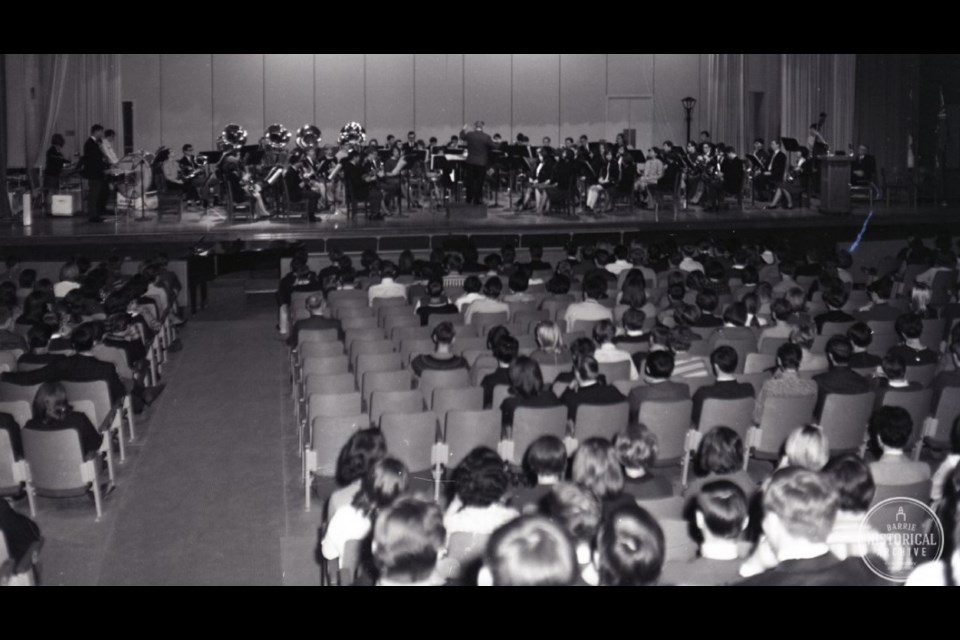Now lost among thousands of other comments, I once came across a social media gem that pointed to the fact we didn’t always know what we had in the person of Gordon Lightfoot.
Having had no luck in hunting down the original comment, I will have to resort to paraphrasing. Essentially, a contributor to my favourite Barrie-centred Facebook nostalgia group shared a telling nugget from a time when Lightfoot had not yet burst into fame.
The story goes that a larger business entity in Barrie was looking for some kind of musical entertainment for a company function when a staff member suggested Lightfoot. The idea was not well received.
“What? That Lightfoot kid? No way. He charges 60 bucks. Far too expensive. Forget it.”
By 1952, Lightfoot had appeared in Barrie on a number of occasions. He was becoming known locally but was far from being a household name at that time.
A notation in the local happenings section of the Barrie Examiner of June 2, 1952, mentioned a recent performance by the 14-year-old singer.
“Special soloist at the morning service at Collier Street United Church here yesterday was master Gordon Lightfoot of Orillia, boy soprano prize winner for the past two years at the Kiwanis Music Festival in Toronto. He was also soloist at the evening service at Essa Road Presbyterian Church.”
Lightfoot’s mother, Jessie Vick Trill Lightfoot, is credited with noticing her son’s natural talent and encouraging it. Lightfoot himself recognized his voice was a gift but his voice alone might not carry him through, so he began to teach himself to play a variety of musical instruments.
The next step was a formal education in music. Gordon moved far from small-town Orillia and travelled to Los Angeles, Calif., to attend the Westlake College of Music. For two years, the young musician supported himself with small gigs and by writing advertising jingles.
Most Canadian musicians who go to the United States never come back. Lightfoot was an exception. He’d had a taste of America, and it wasn’t for him, so he returned to the place he knew best, the source of so much of his lyrical inspiration.
1963 was spent travelling through Europe. The following year, Lightfoot returned to Canada and began to make the connections that would launch him into Canadian folk music prominence. American artists such as Bob Dylan, Judy Collins and Elvis Presley were also eager to record his work.
Lightfoot appeared at the Mariposa Folk Festival for the first time in 1964. The event had originated in his hometown of Orillia but had been banished to Toronto the previous year after numerous complaints about large and unruly crowds at the Orillia venue.
The 1960s were breakout years for the lad from Orillia. Lightfoot toured nationally and, in 1967, became a big part of the Canadian centennial celebrations. It was a bit of a miracle, then, that Barrie North Collegiate managed to secure the rising star for a centennial concert of its own.
Somehow, the graduating class managed to gather Lightfoot’s fee of $1,750 and book him to perform at the auditorium at Central Collegiate.
Lightfoot did not disappoint. More than 1,100 people filled the auditorium to hear the songs and the stories of this down-to-earth local man who was surely going places. The next week, he was off to Expo 67 in Montreal.
In 1969, the students at Barrie North Collegiate attempted to book Lightfoot once again but were unsuccessful due to “financial reasons.”
By then, Lightfoot was becoming a much-sought-after musician, and the 1970s saw him become established as a folk music icon.
He performed until shortly before his death at the age of 84. At the time of his passing, he was booking performances for fees in the range of $40,000 to $75,000 a show. Sixty bucks sounds like a pretty sweet deal now, doesn’t it?
Each week, the Barrie Historical Archive provides BarrieToday readers with a glimpse of the city’s past. This unique column features photos and stories from years gone by and is sure to appeal to the historian in each of us.
